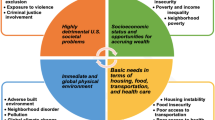Abstract
Reductions in federal support for community mental health threaten adequate services. The difficulty may be compounded by an increase in the number of people who need care. The authors review the literature on the effect of adverse economic events on mental health. Issues and answers for managing the dilemma of increased demand and shrinking resources are identified. These answers include planning, financial diversification, and inter-agency cooperation.
Similar content being viewed by others
References
Acosta, F.X. Self-described reasons for premature termination of psychotherapy by Mexican-American, Black-American, and Anglo-American patients.Psychological Reports 47: 435–443, 1980.
Ahr, P.R., Gorodezky, M.J., and Cho, D.W. Measuring the relationship of admissions to public mental health facilities and rising unemployment.Hospital and Community Psychiatry 32(6):398–401, 1981.
Armstrong, B. Mental health targeted for cuts. APA Monitor, April 1981, 12(4):1, 10–11.
Baekeland, F., and Lundwall, L. Dropping out of treatment: A critical review.Psychological Bulletin 82:738–783, 1975.
Brenner, M.H.Mental illness and the economy. Cambridge, Mass.: Harvard University Press, 1973.
Catalano, R., and Dooley, D. Economic predictors of depressed mood and stressful events in a metropolitan community.Journal of Health and Social Behavior 18:292–307, 1977.
Delbecq, A.L., and Van de Ven, A.H. A group process model for problem identification and program planning.Journal of Applied Behavioral Science 7:466–492, 1971.
Del Gaudio, A.C., Carpenter, P.J., Stein, L.S., and Morrow, G. Characteristics of patients completing referrals from an emergency department to a psychiatric outpatient clinic.Comprehensive Psychiatry 18:301–307, 1977.
Dohrenwend, B.S., and Dohrenwend, B.P. (Eds.).Stresful life events: their nature and effects. New York: Wiley, 1974. (a)
Dohrenwend, B.P., and Dohrenwend, B.S. Social and cultural influences on psychopathology.Annual Review of Psychology 25:417–452, 1974.(b)
Dohrenwend, B.P., Dohrenwend, B.S., Gould, M.S,, Link, B., Neugebauer, R., and Wunschhitzig, R.Mental illness in the United States: Epidemiologic estimates. New York: Praeger, 1980.
Dooley, D., and Catalano, R. Economic change as a cause of behavioral disorder.Psychological Bulletin 87:450–468, 1980.
Grant, I., Sweetwood, H.L., Yager, J., and Gerst, M. Quality of life events in relation to psychiatric symptoms.Archives of General Psychiatry 38:335–339, 1981.
Hammermesh, A.S., and Soss, N.M. An economic theory of suicide.Journal of Political Economy 82:83–98, 1974.
Holmes, T.H., and Rahe, R.E. The social readjustment rating scale.Journal of Psychosomatic Research 11:213–218, 1967.
Johnson, C. The American family during inflationary times.Psychiatric Opinion 16: 13–16, 1979.
Lamb, H.R., and Edelson, M.B. The carrot and the stick: Inducing local programs to serve long-term patients.Community Mental Health Journal 12:137–144, 1976.
Parnes, H.S., and King, R. Middle-aged job losers.Industrial Gerontology 4:77–95, 1977.
Selye, H.Stress without distress. New York: J.B. Lippincott, 1974.
Additional information
The authors thankfully acknowledge James L. Hedlund, Ph.D. for his thoughtful comments in the preparation of this manuscript. Brian Hagan, M.A. is a Senior Research Specialist in the Mental Health Systems Research Unit at the Missouri Institute of Psychiatry, 5400 Arsenal Street, St. Louis, Missouri. Bruce Forman, Ph.D. and Michael Gorodezky, Ph.D. were post-doctoral fellows at the Missouri Institute of Psychiatry at the time this manuscript was prepared. Requests for reprints should be sent to Brian Hagan at the above address.
Rights and permissions
About this article
Cite this article
Hagan, B.J., Forman, B.D. & Gorodezky, M.J. The impact of economic stress on community mental health services. Administration in Mental Health 10, 104–109 (1982). https://doi.org/10.1007/BF00823625
Issue Date:
DOI: https://doi.org/10.1007/BF00823625




